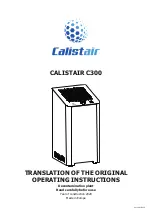
European Safety Systems Ltd.
Impress House, Mansell Road, Acton, London W3 7QH
www.e2s.com
Tel: +44 (0)208 743 8880
Document No. D157-00-651-IS
Issue 2
06-03-2023
Sheet 3 of 14
6) Product Mounting and Access
6.1. Location and Mounting
The sounder should be secured to any flat surface using the
three 7mm fixing holes (see figure 2). The angle can then be
adjusted as required but the mounting restrictions must be
observed (see outline drawings for details, D157-05-001/
D157-05-051 for GNExS1F/GNExS1R). This can be achieved
by loosening the two large bracket screws in the side of the
unit, which allow adjustments in steps of 18°.
Figure 2: Fixing Location for GNExS1[F/R] Sounder.
On completion of the installation the two large bracket
adjustment screws on the side of the unit must be fully
tightened to ensure that the unit cannot move in service.
The enclosure provides IP66 protection and is suitable for
installation in exterior locations providing it is positioned so that
water cannot collect in the horn, and the cable entry is sealed.
6.2. Access to the Flameproof Enclosure
Warning
–
Hot surfaces. External
surfaces and internal components
may be hot after operation, take
care when handling the equipment.
In order to connect the electrical supply cables to the sounder
it is necessary to remove the flameproof cover to gain access
to the flameproof chamber. To achieve by loosening the M3
Grub Screw within the flameproof cover, and then unscrew
the flameproof cover, taking extreme care not to damage the
flameproof joints in the process (see figure 3).
Figure 3: Accessing the Explosion Proof Enclosure.
On completion of the cable wiring installation the flameproof
joints should be inspected to ensure that they are clean and
that they have not been damaged during installation.
Ensure
that the ‘O’ ring seal is in place
and undamaged.
When fitting the flameproof cover ensure the thread is
engaged correctly. Fully tighten the cover all the way, ensure
no gap is visible between the cover and base of the sounder
enclosure. Tighten the M3 grub screw.
7) Installation Requirements
7.1. Installation Standards Compliance
Warning
–
High voltage may be
present, risk of electric shock.
DO NOT open when energised,
disconnect power before opening.
The sounder must only be installed by suitably qualified
personnel in accordance with the latest issues of the relevant
standards.
ATEX / IECEx / UKEx installation standards:
EN60079-14:2008 / IEC60079-14:2007 (Ed4): Electrical
Installations in Hazardous Areas (other than mines).
EN60079-10-1:2009
/
IEC60079-10:2008
(Ed1):
Classification of Areas, Gas Atmosphere
The installation of the units must also be in accordance with
any local codes that may apply and should only be carried out
by a competent electrical engineer who has the necessary
training.
7.2. Cable Selection and Connections
When selecting the cable size, consideration must be given to
the input current that each unit draws (see table 1), the number
of sounders on the line and the length of the cable runs. The
cable size selected must have the necessary capacity to
provide the input current to all the sounders connected to the
line.
Electrical connections are to be made into the terminal blocks
on the PCBA located in the flameproof enclosure using solid
wire 0.5-4mm² / AWG 20-12 or stranded wire, sizes 0.5-
2.5mm² / AWG 24-14. Wire insulation needs to be stripped
8mm. Wires may be fitted securely with crimped ferrules.
Figure 4: Wire Preparation.
Terminal screws need to be tightened down with a tightening
torque of 0.45 Nm / 5 Lb-in. An 8-way terminal block is
provided on the AC Sounder, and a 6-way terminal block is
provided on the DC Sounder.




































